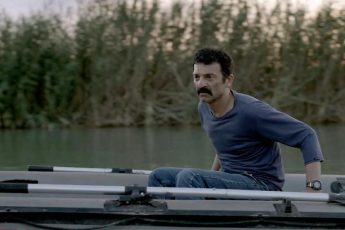Triangle of Madness
Asif Rustamov’s Cold as Marble (Mermer Soyugu, 2022)
Vol. 130 (December 2022) by Isabel Jacobs
Azerbaijani director Asif Rustamov’s second feature was celebrated by the audience at the 53rd edition of the International Film Festival of India (November 20-28). In a nearly sold-out cinema, Cold as Marble screened in the International Competition. Absurd humor mixed with graphic depictions of sexuality and blasphemy seemed to resonate with local cinema-goers. A bizarre take on contemporary relationships, Cold as Marble is a timeless tale of desire and revenge. It was a big winner at Tallinn Black Nights Film Festival, where Gurban Ismailov received the award for Best Actor. Rustamov’s erotic thriller, at times a little immature, is most successful when it manages to deploy the power of its cast. All three actors are pitch-perfect in this odd ménage à trois.
Cold as Marble spins a violent trail of ghostly determination across generations. The opening scene introduces two of our main protagonists, both unnamed, just after they finished making love in a ritzy apartment. The camera wanders from a gramophone onto the naked body of a woman (Natavan Abbasli) who seductively balances a cigarette between her toes. The gramophone plays jazzy lounge music, and the lights are dimmed. Almost immediately I regret watching Cold as Marble. Is this a historical drama or a 1990s rom-com? Wait a minute: we are in the historical house museum of an Azerbaijani scientist! The woman, a museum guide, invited over her lover (Elshan Asgarov), a struggling artist with one blind eye. It turns out this young man is not only physically impaired. He also has a troubled past.
In a clichéd way, the set-up is already tragic. We learn that the stunning femme fatale is married to an older Baku businessman who trades with Russia. Does she merely use the young artist or is she in love with him? “One man’s wife is another man’s whore is another man’s museum guide,” we are told later in the film. Rustamov’s world is cold as marble: we never know what his characters really think or feel; their actions accelerate a disastrous plot. While other painters put their work on display in the white cubes of Baku’s art world, the one-eyed artist has to engrave marble gravestones for a living. (Is it a coincidence that since Hesiod, it is the Cyclopes, also one-eyed, who are known as skilled craftsmen fashioning ornaments for heroes and gods?)
The artist’s father went to prison for killing his wife, for whom the son crafted his first gravestone. Trauma is omnipresent: the artist refuses to enter the bedroom where his mother was murdered. In one scene, prefiguring the incestuous perversity to come, his girlfriend wants to fuck in the bed where his mother was murdered. If all that sounds unbearable — well, it is until Rustamov’s third protagonist enters: the not-so-remorseful murderer (Gurban Ismailov).
After another night of passion in the house museum, the artist returns home only to realize that his father has been released from prison. The son now wants to find out why his father killed his mother — while his girlfriend has to make some hard decisions about her husband. And the father? He has just started to enjoy himself after a decade in prison (one morning, the son picks up a bra in the kitchen). During the day the father joins his artist-son at the cemetery, reciting verses of the Quran to console bereaved mourners.
With Ismailov alluring his audience, Rustamov’s film suddenly speeds up. One neat scene follows another, all of them brilliantly acted. The disastrous triangle, father-girlfriend-son, becomes increasingly claustrophobic. What began as a clumsy tragicomedy now turns into a gripping thriller centered around Ismailov’s shady character. We are drawn to this ambiguous figure: charismatic mullah, womanizer, psychopath. He is given a standing ovation by the audience in Goa when he tells his son to shave off the man bun because he “looks like a faggot.” I find it hard not to be repulsed by Rustamov’s cult of masculinity and paternal authority. (Homosexuality remains a taboo in Azerbaijani society, with high rates of violence against LGBTQ+ people.)
Once again co-written with Roelof Jan Minneboo, Rustamov’s story keeps viewers engaged: even at the very end, some mysteries are unresolved. History repeats itself as mad desire. Equally surprising and disappointing, Cold as Marble leaves a mixed impression. The extraordinary performance of the cast is compromised by cheap symbolism. Some suspense is there, but it lacks substance. Not all the moral ambiguities seem deliberate. Yet, the way in which Rustamov infuses religious tropes with dark irony is memorable. His tale is so devoid of cultural specificity that it could be set anywhere, at any time. It is this veneer of universality that ultimately makes his film cold as marble.




Leave a Comment